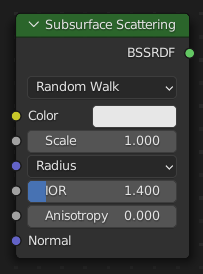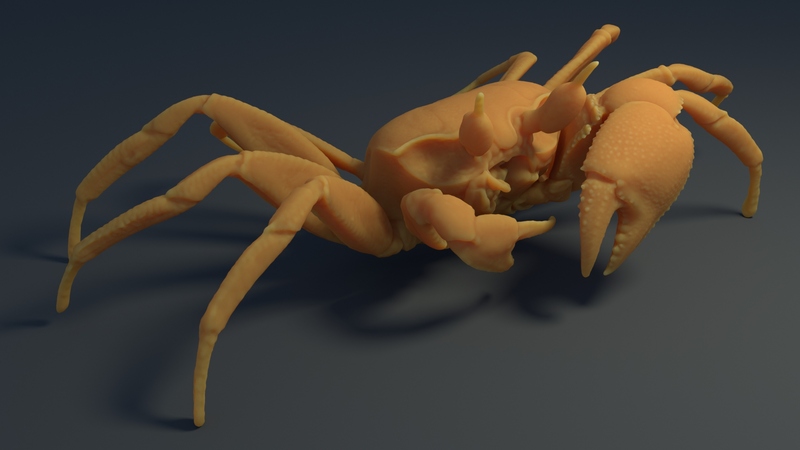Subsurface Scattering (Tán Xạ Dưới Bề Mặt)¶

The Subsurface Scattering node is used to add simple subsurface multiple scattering, for materials such as skin, wax, marble, milk and others. For these materials, rather than light being reflect directly off the surface, it will penetrate the surface and bounce around internally before getting absorbed or leaving the surface at a nearby point.
How far the color scatters on average can be configured per RGB color channel. For example, for skin, red colors scatter further, which gives distinctive red-colored shadows, and a soft appearance.
Đầu Vào (Inputs)¶
- Màu Sắc (Color)
Màu sắc của bề mặt, hoặc về vật lý mà nói, ánh sáng được phản xạ trên mỗi bước sóng.
- Tỷ Lệ (Scale)
Global scale factor for the scattering radius.
- Bán Kính (Radius)
Khoảng cách trung bình mà ánh sáng tán xạ ra dưới bề mặt. Bán kính lớn hơn sẽ cho hiện trạng mềm mại hơn vì ánh sáng xâm nhập vào các vùng tối và đi xuyên qua đối tượng. khoảng cách tán xạ sẽ được xác định riêng biệt cho các kênh RGB, để kết xuất nguyên vật liệu giống như da thịt, cái mà ánh sáng đỏ nguồn phân tán sâu hơn. Các giá trị X, Y và Z được là Ánh Xạ sang các giá trị R, G và B trong cặp đôi tương ứng.
- IOR Duy Cycles (Cycles Only)
Index of refraction for "Tán Xạ Dưới Bề Mặt".
- Dị Hướng Duy Cycles (Cycles Only)
Directionality of subsurface scattering. Higher anisotropy scatters deeper into the object.
- Độ/mức gồ ghề/rối/ráp/nhám (Roughness) Duy Cycles (Cycles Only)
Roughness of the glossy surface surrounding the subsurface volume.
- Normal (Pháp Tuyến/Bình Thường)
Pháp tuyến sử dụng cho quá trình tô bóng; nếu không có gì kết nối thì pháp tuyến tô bóng mặc định sẽ được sử dụng.
Tính Chất (Properties)¶
- Phương Pháp Tán Xạ Dưới Bề Mặt (Subsurface Method)
Phương pháp kết xuất để mô phỏng tán xạ dưới bề mặt.
Ghi chú
EEVEE does not support the Random Walk methods.
- (Christensen-Burley) (Christensen-Burley):
An approximation to physically-based volume scattering. This method is less accurate than Random Walk however, in some situations this method will resolve noise faster.
- Tiến Bước Ngẫu Nhiên [Bán kính cố định] (Random Walk [Fixed Radius]):
Provides accurate results for thin and curved objects. Random Walk uses true volumetric scattering inside the mesh, which means that it works best for closed meshes. Overlapping faces and holes in the mesh can cause problems.
- Tiến Bước Ngẫu Nhiên (Random Walk):
Behaves similarly to "Tiến Bước Ngẫu Nhiên [Bán Kính Cố Định]" but modulates the "Bán Kính" based on the "Màu Sắc", "Dị Hướng", and "IOR". This method thereby attempts to retain greater surface detail and color than "Tiến Bước Ngẫu Nhiên [Bán Kính Cố Định]".
Đầu Ra (Outputs)¶
- Bidirectional Scattering Surface Reflectance Distribution Function: Hàm Phân Phối Phản Xạ Bề Mặt Tán Xạ Hai Chiều
BSSRDF shader output.
Một Số Ví Dụ (Examples)¶

Đi bộ ngẫu nhiên của tán xạ dưới bề mặt.¶